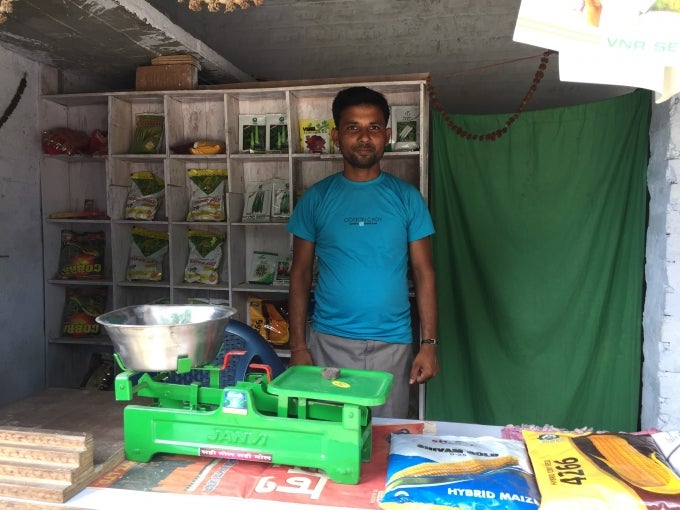
Rahul Kumar is a 25-year-old community extension worker at Jeevika in the eastern Indian state of Bihar. He set up an agri-business enterprise six months ago and it’s turned out to be quite a success. Kumar earned more than INR 180,000 ($2,700) in barely one month during the rainy season crop cycle, also known as Kharif crop in India. What’s more, he sold quality seeds and other agriculture inputs to more than 150 farmers during that period, helping them save over INR 50,000. “Whatever I could earn as a Village Resource Person (VRP) over a period of one year, I managed to earn that much as an agri-entrepreneur in just one month,” said Kumar.
A three-way partnership between JEEViKA (a Government of Bihar supported program for economic empowerment), Syngenta Foundation India (a civil society organization working towards enhancing farmers’ incomes) and the National Institute of Rural development & Panchayati Raj (NIRDPR), an academic institution helped Kumar and his farmer friends achieve a remarkable turnaround in their fortunes.
In this partnership, NIRDPR provided training to the budding entrepreneurs under the overall technical support of SFI, who provided on-the-ground hand-holding and mentoring support. JEEViKA provided the institutional platform from where promising local youths were identified, selected and incubated to work as entrepreneurs. The community organizations, in many cases, also provided the initial credit for seed capital to these entrepreneurs to start their agri-business ventures.
Pathal Ram, a small farmer from the same village said, “If I could get good quality seeds and other inputs at my home, what is the point of going to the market? It saves my time and money. I could use this time in my field for better cultivation.”
Most of the AEs have evolved from their earlier roles as VRPs under the JEEViKA project, providing limited set of extension services to a group of farmers. Their journey from VRPs to agri-entrepreneurs took them through an extremely competitive process. Of more than 1000 youth, who registered for the program, around 200 (5:1) were selected following a multi-stage selection process, involving written tests, interview, and socio- psychometry test to gauge their aptitude for entrepreneurship. Under the program, the selected youths undergo a 45-day residential training program with NIRDPR, which equips every AE with the requisite agricultural knowledge, entrepreneurial and soft skills required to work intensively with farmers. To facilitate experiential and on-the-job learning, field trips and apprentice programs with existing AEs are also organized during the later phase of the program. All AEs are trained on how to use digital kits to run his/her own agri business using mobile apps; capturing market signals, insights/intelligence etc. Most of these entrepreneurs are between the age group of 18-35 years and are mostly high school graduates.
These AEs are working as change agents, transforming agriculture in Bihar from the bottom up. The AEs have been provided tablets to maintain digital databases of their farmer clients, with tailored digital content available for different farmers.
The program has also integrated digital financial services with many of the AEs trained to serve as Customer Service Providers (CSPs), in partnership with Spice Money, a Non-Banking Finance Company (NBFC) facilitating farmers in financial transactions at the village itself. Sangita Kumari from village Belapemu in Purnea district is an AE cum CSP and has facilitated transactions amounting to INR 555,000 within the first two months of being operational. In addition to receiving digital payments for inputs supplied to farmers, the platform supports Aadhar enabled payments, direct money transfer, and mobile recharges, among others.
JEEViKA ensures that these AEs behave responsibly and do not indulge in any business mal-practices and maintain their focus towards the ultimate client i.e. farmers. Over the next few months, the AEs plan to work with input dealers, farm equipment manufacturers, product users as well as banks to provide various agricultural services required by farmers.
As of October 2018, 160 AEs associated with JEEViKA are operational, serving approximately 20,000 farmers. The model is being scaled up across Andhra Pradesh, Bihar, Jharkhand, Madhya Pradesh, Maharashtra and Odisha.
The cost of last -mile delivery of quality products and services specially to small and marginal farmers in India is quite high. The early signs of the AE model suggest that this could potentially solve the challenge of last mile delivery of services and bring the youth back to agriculture. More importantly, it could create an ecosystem where tech savvy, frontline champions support marginalized farmers in adopting improved production technologies and inputs, a transition fundamental to the goal of doubling farmers’ income.





Join the Conversation